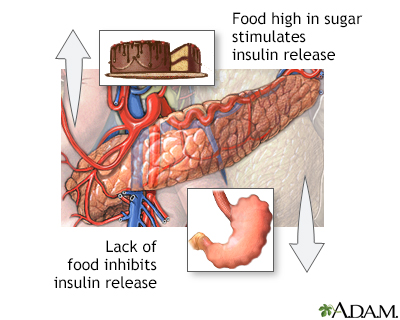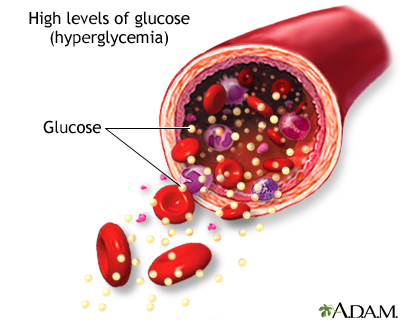Pregnancy SmartSiteTM
Hyperglycemia - self care; High blood glucose - self care; Diabetes - high blood sugar DescriptionHigh blood sugar is also called high blood glucose, or hyperglycemia. High blood sugar almost always happens in people who have diabetes. High blood sugar occurs when:
Insulin is a hormone that helps the body move glucose (sugar) from the blood into muscle or fat, where it is stored for later use when energy is needed. Sometimes high blood sugar occurs due to stress from surgery, infection, trauma, or medicines. After the stress is over, blood sugar returns to normal. Symptoms of High Blood SugarSymptoms of high blood sugar can include:
You may have other, more serious symptoms if your blood sugar becomes very high or remains high for a long time. Over time, high blood sugar weakens your immune system and makes it more likely for you to get infections. What to Think About When Your Blood Sugar is HighHigh blood sugar can harm you. If your blood sugar is high, you need to know how to bring it down. If you have diabetes, here are some questions to ask yourself when your blood sugar is high:
Are you taking your diabetes medicines correctly?
What else has changed?
Preventing High Blood SugarTo prevent high blood sugar, you will need to:
You and your provider will:
If your blood sugar is higher than your goals over 3 days and you don't know why, check your urine for ketones. Then contact your provider. ReferencesAmerican Diabetes Association Professional Practice Committee. 5. Facilitating Positive Health Behaviors and Well-being to Improve Health Outcomes: Standards of Care in Diabetes-2024 [published correction appears in Diabetes Care. 2024 Feb 05]. Diabetes Care. 2024;47(Suppl 1):S77-S110. PMID: 38078584 pubmed.ncbi.nlm.nih.gov/38078584/. American Diabetes Association Professional Practice Committee. 6. Glycemic Goals and Hypoglycemia: Standards of Care in Diabetes-2024. Diabetes Care. 2024;47(Suppl 1):S111-S125. PMID: 38078586 pubmed.ncbi.nlm.nih.gov/38078586/. Atkinson MA, Mcgill DE, Dassau E, Laffel L. Type 1 diabetes. In: Melmed S, Auchus RJ, Goldfine AB, Koenig RJ, Rosen CJ, eds. Williams Textbook of Endocrinology. 14th ed. Philadelphia, PA: Elsevier; 2020:chap 36. Riddle MC, Ahmann AJ. Therapeutics of type 2 diabetes. In: Melmed S, Auchus RJ, Goldfine AB, Koenig RJ, Rosen CJ, eds. Williams Textbook of Endocrinology. 14th ed. Philadelphia, PA: Elsevier; 2020:chap 35. | |
| |
Review Date: 2/28/2024 Reviewed By: Sandeep K. Dhaliwal, MD, board-certified in Diabetes, Endocrinology, and Metabolism, Springfield, VA. Also reviewed by David C. Dugdale, MD, Medical Director, Brenda Conaway, Editorial Director, and the A.D.A.M. Editorial team. The information provided herein should not be used during any medical emergency or for the diagnosis or treatment of any medical condition. A licensed medical professional should be consulted for diagnosis and treatment of any and all medical conditions. Links to other sites are provided for information only -- they do not constitute endorsements of those other sites. No warranty of any kind, either expressed or implied, is made as to the accuracy, reliability, timeliness, or correctness of any translations made by a third-party service of the information provided herein into any other language. © 1997- A.D.A.M., a business unit of Ebix, Inc. Any duplication or distribution of the information contained herein is strictly prohibited. | |

 Food and insulin r...
Food and insulin r... High blood sugar
High blood sugar
